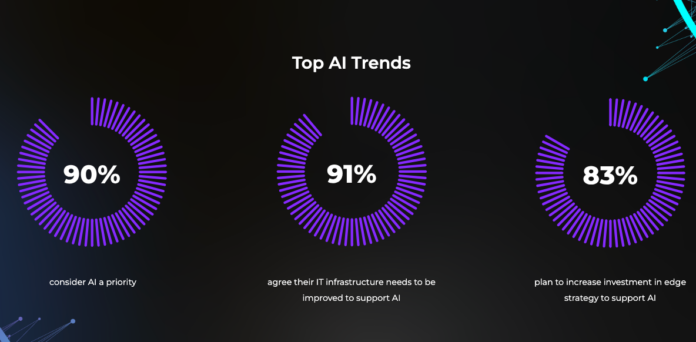The deployment of artificial intelligence (AI) could be a priority for 90% of organisations in the Asia-Pacific region including Japan (APJ), according to a report from Nutanix.
The report is based on a global research study conducted by Vanson Bourne, on behalf of Nutanix, surveying 200 IT, DevOps, and Platform Engineering decision makers between July and September 2023. Respondents were based in North and South America; Europe, the Middle East, and Africa (EMEA); and the APJ region.
The study found that most APJ firms are planning investments to support it — whether to modernise their IT infrastructure (84%) or to advance their edge strategy (81%).
Findings also show that APJ organisations plan to embrace AI solutions but are slowed by a generative AI skills gap.
The top two AI solutions deployed by APJ organisations include virtual assistants/customer support bots (50%), as well as a mix of generative AI solutions (52%).
However, when it comes to AI solution implementation, APJ respondents indicate they lack generative AI and prompt engineering skills and they also require more data scientists and data science skills to support their initiatives.
Also, data security and governance are at the forefront of enterprise AI decision-making – not cost. Among respondents, data security, data quality, scalability and speed of development were the top considerations related to running their AI workloads.
Additionally, more than 92% of respondents say that security and reliability are important considerations in their AI strategy.
Respondents consistently indicated that data security and governance, including data quality and data protection, are of paramount importance to support AI technologies and services.
This may create a windfall for related IT infrastructure markets – specifically for data storage, security, governance and protection – as new and growing AI technology budgets are allocated to these essential functions.
Further, companies are more likely to purchase existing AI models or leverage existing open-source AI models (86%) to build their AI applications than to build their own models (5%). This is five points lower than the global average of 10%.
This inclination could stem from a confluence of factors, including the substantial costs associated with in-house AI model development, a dearth of skilled AI personnel within the region, and the abundance of readily available pre-trained AI models applicable to diverse purposes.
In addition, 56% of APJ respondents say they plan to improve data movement between cloud, data centre and edge environments. Likewise, 55% of APJ respondents said they plan to improve data movement between multiple public clouds.
Aaron White, Nutanix VP and general manager of APJ sales, said AI is no longer just a buzzword, but a fundamental driver of enterprise evolution and data centre modernisation in 2023 and beyond.
White added that while many enterprises have rapidly adopted AI and are reaping the short-term benefits of early adoption, it’s important to remember that AI adoption is a marathon, not a sprint.
“The adoption strategy will be a key differentiator setting enterprises up for long-term success,” said White.
“As more enterprises adopt AI applications and workloads, we can expect a new wave of IT infrastructure modernisation initiatives focused on data mobility, security, and protection,” he said.
















